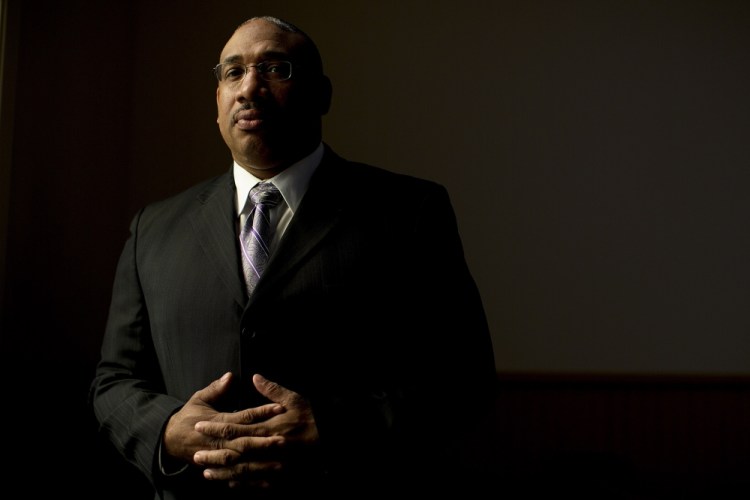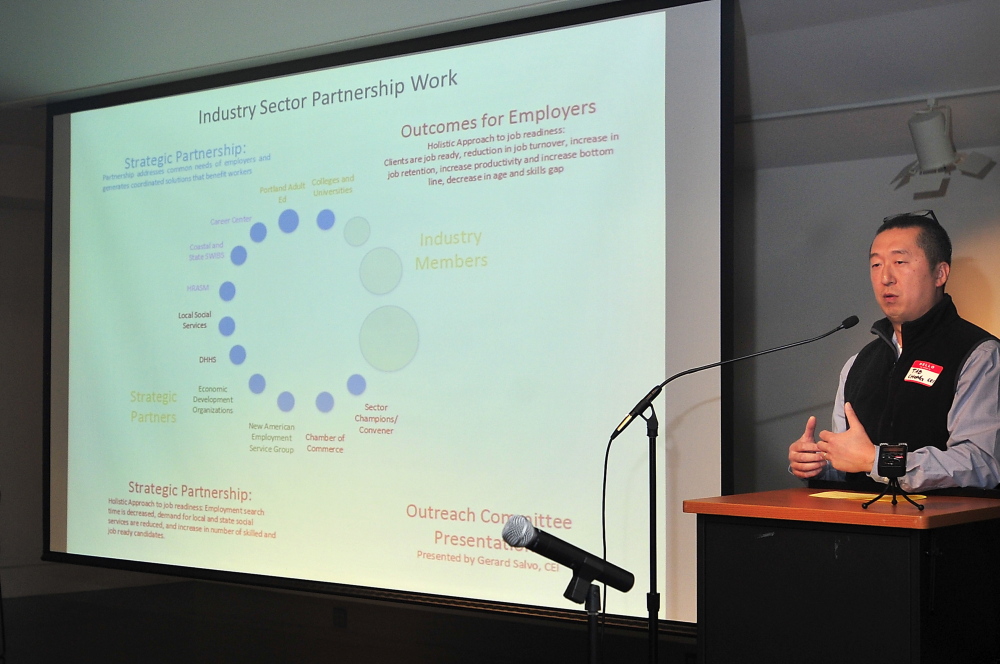A proposal to create an Office of New Americans at Portland City Hall to help integrate immigrants into the workforce and community received push-back Tuesday from some community members concerned that it would be divisive and ignore the needs of other minority groups.
Portland has been a refugee resettlement area for decades and currently has more foreign-born residents than any other Maine community.
While several speakers endorsed the new office during a public hearing, others were concerned that having an office dedicated to foreign-born residents would further disenfranchise other groups – including African-Americans, Latinos and young adults – who have lived here for years and are struggling to get by. There also were concerns that the office could hamper work being done by other community groups.
“When you tag it with the name ‘New American’ you’re making a statement, and it’s the wrong statement. It’s exclusive. It’s not inclusive,” said the Rev. Kenneth Lewis, pastor of Green Memorial AME Zion Church. “We have to engage our young adults in a way that’s going to make the city vibrant and make the city grow, and I don’t think you do that through a lens of ‘New Americans.’ ”
ROLES FOR NEW OFFICE, NEWCOMERS
Exploring the creation of an Office of New Americans was deemed a priority by the City Council and announced by Mayor Ethan Strimling during his State of the City address. City Manager Jon Jennings has recommended allocating $10,000 in next year’s budget to begin establishing the office.
The council’s Economic Development Committee is charged with making a recommendation to the full council. Tuesday’s public hearing, which drew more than 50 people, was the beginning of a fact-finding process to see what role the office could play.
Dan Wallace of the Partnership for a New American Economy, a group founded in 2010 by then-New York City Mayor Michael Bloomberg, said Portland would become the smallest city in the nation to establish an Office of New Americans.
Several immigrants and community groups, including the Portland Community Chamber of Commerce, voiced support for the new office, but some didn’t like the name. They urged the city to tread carefully if it proceeds so it doesn’t interfere with or duplicate work already being done by dozens of community groups and service providers, including the city’s Office of Refugee Affairs, Portland Adult Education, the Portland Jobs Alliance and a number of immigrant-led community groups.
Instead, some argued that the office should help coordinate and communicate with service providers, provide information to new Mainers online in multiple languages, be a welcoming place in City Hall and collect data about the contributions of the immigrant community.
“Sometimes we become scapegoats of politicians because there is no data,” said Damas Rugaba, president of Rwanda Community Association of Maine.
Tae Chong, of Coastal Enterprises Inc., which provides business counseling and financial services, said the office could help “connect the dots” for community service providers, as well as branding and advertising the city to attract new immigrants.
“They are coming here and we need to make sure we’re getting the best out of them and make sure more people come,” Chong said. “This office is really about economics. We’re trying to help families move ahead.”
However, Strimling said he doubts that the problem is a lack of coordination. He defended the city’s focus on new Americans, saying they have higher rates of poverty than native-born residents.
“My fear in this (is) if you get too broad you lose focus,” he said.
NEW ARRIVALS BY THE NUMBERS
Portland has the largest concentration of immigrants in the state, with 9,902 foreign-born residents living here in 2013, making up 15 percent of the population, according to a report released March 16 by Coastal Enterprises. Portland’s immigrant community doubled in size between 2000 and 2013, helping the city’s overall population increase by 3 percent even as its native-born population has declined.
And immigrants are twice as likely to start their own business, the report said.
The report also indicated that immigrants in Portland from 2009-2013 were three times as likely to be unemployed, and 40 percent lived below the poverty line, compared with 10 percent of native-born residents. When employed, the median income of immigrants is about half of native-born annual salaries of nearly $47,000. And unemployment among English-proficient students in 2013-2014 was as high as 38 percent.
“This discrepancy suggests that immigrants face specific challenges to entering and succeeding in Maine’s workforce,” the report states. Those barriers include limited language skills, training and certification that do not transfer to the U.S., a lack of work history here, no transportation and racism/discrimination.
IMMIGRANTS AS UNDERUSED RESOURCE
Before the hearing, Wallace, with the Partnership for a New American Economy, said immigrants should be playing a larger role in Maine’s economy. Maine residents are among the oldest in the nation and the state is one of two that sees more deaths than births, he said.
Wallace said it’s not a coincidence that Maine has one of the smallest foreign-born populations and one of the more sluggish economies in the country.
“All of this means that without significant change there will be fewer workers in Maine’s economy and more retirees, which will drive up health care and entitlement spending and put a strain on employers seeking the workers they need to operate and grow,” he said.
Wallace said more than 20 cities nationwide have established local Offices of New Americans, while another 60 cities and counties have designated themselves as “welcoming” to immigrants. The offices help immigrants become citizens, make local government more accessible, place immigrant entrepreneurs in funding programs to grow their businesses and create jobs, connect under-employed and highly skilled immigrants to employers, and assist immigrants with opening bank accounts.
He said that in 2013, the U.S. Chamber of Commerce recognized the immigrant program in Dayton, Ohio, which helped reverse decades of population loss and boosted the local economy. Other success stories include Nashville, Tennessee, Denver and Philadelphia, Wallace said.
“Because these offices have made immigrant integration a high-profile, Cabinet-level issue, they have been able to attract support for public-private partnerships that leverage external funding in support of local priorities,” he said.
Send questions/comments to the editors.




